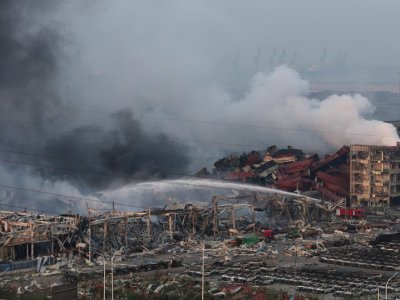-
Tips for becoming a good boxer - November 6, 2020
-
7 expert tips for making your hens night a memorable one - November 6, 2020
-
5 reasons to host your Christmas party on a cruise boat - November 6, 2020
-
What to do when you’re charged with a crime - November 6, 2020
-
Should you get one or multiple dogs? Here’s all you need to know - November 3, 2020
-
A Guide: How to Build Your Very Own Magic Mirror - February 14, 2019
-
Our Top Inspirational Baseball Stars - November 24, 2018
-
Five Tech Tools That Will Help You Turn Your Blog into a Business - November 24, 2018
-
How to Indulge on Vacation without Expanding Your Waist - November 9, 2018
-
5 Strategies for Businesses to Appeal to Today’s Increasingly Mobile-Crazed Customers - November 9, 2018
Supercomputer shut down due to China blasts
Tianhe-1A, located at the National Supercomputing Center in Tianjin, is just kilometers from the blast center.
Advertisement
When a warehouse full of explosives blew up in a massive fireball in Tianjin, China on Wednesday, the technicians supervising the Tianhe-1A supercomputer felt the ground shake violently even though they were in a hardened facility more than a kilometer away from Wednesday’s explosion.
As a security precaution, staff at the facility decided to manually shut down Tianhe-1A thirty minutes after the blast had occurred, according to Xinhua.
It was recognized as the world’s fastest computing system in 2010.
The shockwaves due to the blasts shattered windows at the centre and and led to the collapse of ceilings inside the building, according to the centre’s staff.
This video from IDG News provides a rare look at the Tianhe-1 supercomputer in China.
The deadly explosion that rocked the Chinese city of Tianjin has caused the country to shut down a nearby supercomputer, also one of the fastest in the world. The accomplishment also represented one of the earliest petascale machines and China’s second (after Nebulae).
As Yang Xuejun, Tianhe-1A’s chief designer and a professor at the National University of Defense Technology, commented back in 2010: “the key to the high performance of Tianhe-1A is the hybrid architecture of the integration of the CPUs and GPUs (Graphics Processing Units)”. Talking about the supercomputer Tianhe-1A, it can perform 2.57 quadrillion computing operations per second. “Tianhe” is the Chinese word for the Milky Way constellation. Both machines were developed by China’s National University of Defense Technology, based in Changsha. The supercomputer is safe, as it has been placed in a reinforced computer room.
Advertisement
Tianhe-1 weighs 150 tonnes and covers an area of 1,000 square metres. “Satellite photos suggest a blast radius of almost 2 miles”. Ltd, housed toxic chemicals and other risky materials.





























